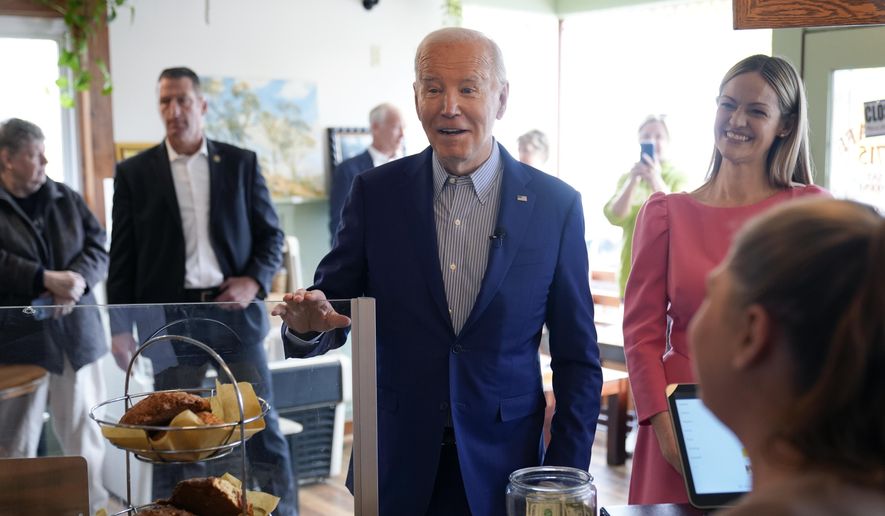PITTSBURGH — President Biden on Wednesday called for tripling the tariff rate on steel and aluminum imported from China, a move aimed at preventing American manufacturers from being undercut by lower-cost imports.
Mr. Biden said he’ll ask U.S. Trade Representative Katherine Tai to triple the existing 7.5% tariff.
“They’re not competing, they’re cheating and we’ve seen the damage here in America,” Mr. Biden said of China during remarks at the United Steelworkers headquarters in Pittsburgh.
The president’s remarks to the powerful labor union were part of his three-day campaign swing through battleground Pennsylvania. He is touring the state making his economic pitch to voters.
Mr. Biden also announced a new trade representative investigation into China‘s aggressive support for shipbuilders and other related industries, after unions complained about what they view as Beijing’s anti-competitive practices. He will also unveil a series of initiatives to work with Mexican officials to block China from evading American steel tariffs by moving its exports through Mexico.
The moves are Mr. Biden‘s most aggressive to date targeting the flood of low-cost Chinese exports from undermining American-made manufacturing, which is the centerpiece of his economic agenda.
The exports are boosted through heavy subsidies from the Chinese government and cheap labor, fueling the country’s rapid economic growth in recent months.
“I’m not looking for a fight with China. I’m looking for competition, a fair competition,” Mr. Biden said.
The U.S. and other nations, however, say China is harming their manufacturing and flouting international trade laws.
Both Mr. Biden and former President Trump, the presumptive GOP nominee, have made raising tariffs and other trade restrictions a key part of their pitch to unions, factory workers and other work-class voters
Mr. Trump had initially proposed raising tariffs on Chinese steel and aluminum when he was in office.
“When a country just rips us off like China, then what I did is that the tariffs, and the tariffs were forcing companies back to the United States,” Mr. Trump told CNBC last month.
Republican National Committee Chairman Michael Whatley accused Mr. Biden of borrowing from the same Trump-era policies that the president frequently criticizes.
“Since taking office, Joe Biden has caved to China and left American workers behind. Now, after four years of failure, he’s finally following President Trump’s lead on tariffs. Americans deserve leadership, not lip service – and it’s clear that we need President Trump back in office to deliver stronger trade deals that put America First,” he said in a statement.
Treasury Secretary Janet Yellen traveled last week to China, where she raised concerns that Beijing subsidies are creating an oversupply of clean energy products like solar panels and electrical vehicles. She expressed concern that overcapacity could flood the global markets at artificially cheaper prices, possibly stifling competition.
Chinese officials have denied the overcapacity claims, insisting that its abundance of supply is because of “constant innovations,” not government subsidies.
The fight over tariffs comes as Mr. Biden tries to balance the geopolitical landscape with concerns over the U.S. economy. The Biden administration has worked to lower tensions with Beijing, which was angered over Mr. Trump’s initial round of Chinese tariffs, which almost touched off a trade war.
Tariffs could potentially disrupt the U.S. economy by raising manufacturing costs that may ultimately translate to higher consumer prices. That could make Mr. Biden‘s efforts to bring down stubborn inflation more complicated.
Inflation has slowed since its peak of roughly 9% in the summer of 2022, but it remains elevated. A Labor Department last month revealed that March prices were 3.5% higher than they were during the same period last year.
• Jeff Mordock can be reached at jmordock@washingtontimes.com.




Please read our comment policy before commenting.